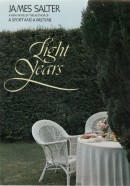 Peter Stamm’s Seven Years, translated from the German, tells a familiar story in a startling way. The story is that a husband is vaguely dissatisfied with his marriage, and ends up cheating on his wife. But Alex, an architect, chooses (or doesn’t choose, but is inexplicably compelled toward) an exceedingly odd object of affection. His wife, Sonia, a fellow architect, is brilliant and beautiful. His occasional lover, Ivona, is . . . not those things.
Peter Stamm’s Seven Years, translated from the German, tells a familiar story in a startling way. The story is that a husband is vaguely dissatisfied with his marriage, and ends up cheating on his wife. But Alex, an architect, chooses (or doesn’t choose, but is inexplicably compelled toward) an exceedingly odd object of affection. His wife, Sonia, a fellow architect, is brilliant and beautiful. His occasional lover, Ivona, is . . . not those things.
Alex is both “excited and repulsed” by Ivona. We have to take his word about the excited part. Ivona is nearly mute, and when she does speak, it’s to awkwardly blurt out her obsessive love for him. The physical descriptions of her are thoroughly off-putting. God help me, but I kept picturing her as Kathy Geiss from 30 Rock.
Alex seems most drawn to Ivona because she is a void. Life with Sonia requires Alex to care about the usual signposts in life, his career, his children, his home and his cars, his retirement fund. As for Ivona: “She took me without expectations and without claims.” But this is not enough of an explanation. Many people might satisfy the condition of no expectations while providing a clearer sense of pleasure. Alex tells the story in installments to Antje, a friend staying with him, Sonia, and their daughter, Sophie. Complete with a twist, this framework of the book — the telling of it to Antje — causes it to unfold as an unnerving fairy tale, a stubbornly unrevealing philosophical investigation of the origins and purposes of desire.
Earlier this year, I read Light Years by James Salter, a very different book also about a couple coming apart at the seams. I’d been meaning to read Salter, and followed Light Years with A Sport and a Pastime.
Several of the most powerful moments in Light Years are stark and aphoristic (“In the end she would forget him; that was how she would win.”), and more potent for appearing in the midst of Salter’s otherwise complex (but still elegant) prose.
 Geoff Dyer called the book’s central couple, Nedra and Viri, “possibly the most irritatingly named characters in literature.” It’s not just the names. The central characters are pretentious and easily dissatisfied, and say things out loud like, “The only thing I’m afraid of are the words ‘ordinary life.’” Despite a lack of fellow feeling with the characters, I liked Light Years quite a bit, because Salter can flat-out write. Here he describes the feeling of a relationship just after it has been sundered: “A fatal space had opened, like that between a liner and the dock which is suddenly too wide to leap; everything is still present, visible, but it cannot be regained.”
Geoff Dyer called the book’s central couple, Nedra and Viri, “possibly the most irritatingly named characters in literature.” It’s not just the names. The central characters are pretentious and easily dissatisfied, and say things out loud like, “The only thing I’m afraid of are the words ‘ordinary life.’” Despite a lack of fellow feeling with the characters, I liked Light Years quite a bit, because Salter can flat-out write. Here he describes the feeling of a relationship just after it has been sundered: “A fatal space had opened, like that between a liner and the dock which is suddenly too wide to leap; everything is still present, visible, but it cannot be regained.”
Elsewhere, in a rich and hilarious early scene, a maniacally fastidious tailor ends up comparing a badly made shirt to “the story of a pretty girl who is single and one day she finds herself pregnant. It’s not the end of life, but it’s serious.”
After reading two books by Salter, I want to read more. I also feel that I understand why he’s beloved by a certain set of writers and editors but never reached quite the audience of some of the writers who sing his praises.

